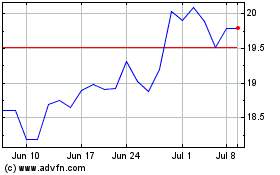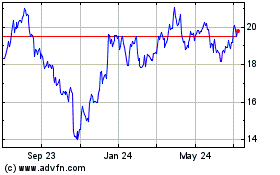Accounting Rule Maker FASB Rejects Proposal on Loan Losses
April 03 2019 - 12:28PM
Dow Jones News
By Michael Rapoport
Accounting rule makers on Wednesday rejected a proposal by
regional banks to soften the impact of a change that will force
banks to book losses on soured loans much faster.
The rejection means the accounting change - known as CECL, for
current expected credit losses - will go forward as planned at the
start of 2020 for publicly traded U.S. banks.
CECL will require banks to record all expected future losses on
their loans as soon as they are issued. That will force some banks
to boost their loan-loss reserves, cutting into earnings and
regulatory capital.
Regional banks like Capital One Financial Corp., BB&T Corp.
and Regions Financial Corp. had argued the need to book losses up
front would discourage lending and worsen any future economic
downturn. They have pressed their case with members of Congress and
regulators, and last fall they urged the Financial Accounting
Standards Board, which sets accounting rules for U.S. companies, to
modify CECL to lessen its impact on earnings.
But the FASB voted down that idea Wednesday. FASB members said
the banks' proposal wouldn't provide enough benefits to justify the
cost, and that they had previously considered and rejected similar
ideas.
Under the banks' proposal, only reserves for the first 12
months' worth of expected loan losses, instead of all future
losses, would have been counted against a bank's net income. But
the idea "just wasn't operable, " said FASB member Hal
Schroeder.
Representatives of the regional banks couldn't immediately be
reached for comment. Michael Gullette, an American Bankers
Association official, said the FASB's rejection doesn't resolve
"significant concerns about the impact this accounting change could
have on banks and their ability to lend." A comprehensive study of
CECL's effects is needed to address those concerns, he said.
The FASB adopted CECL in 2016, prompted by criticism that banks
had booked losses too slowly after the 2008 financial crisis,
because current rules call for banks to recognize losses only after
there is evidence the losses have actually occurred. That had left
investors in the dark about banks' true health, critics said.
Booking all expected future loan losses immediately means some
banks will have to add substantially to their loan-loss reserves
when CECL takes effect. JPMorgan Chase & Co., for instance,
estimated in its annual report that the rule would lead it to
increase its reserves by $4 billion to $6 billion, or 30% to 45%.
Citigroup Inc. has estimated a 10% to 20% increase in its reserves,
which would be $1.2 billion to $2.5 billion.
The FASB's move is separate from a step banking regulators took
in December, when they agreed to allow banks to phase in CECL's
impact on their regulatory capital over three years.
Write to Michael Rapoport at Michael.Rapoport@wsj.com
(END) Dow Jones Newswires
April 03, 2019 12:13 ET (16:13 GMT)
Copyright (c) 2019 Dow Jones & Company, Inc.
Regions Financial (NYSE:RF)
Historical Stock Chart
From Mar 2024 to Apr 2024

Regions Financial (NYSE:RF)
Historical Stock Chart
From Apr 2023 to Apr 2024
